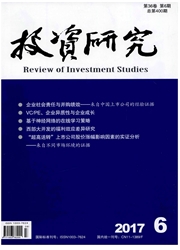

 中文摘要:
中文摘要:
本文采取HongandLee(2005)的广义谱方法,对沪深两市的大盘指数进行检验。为适合转轨经济体的新兴市场特点,结合了滚动技术,动态的检验股市有效性的变化,并比较在不同时间窗宽下的滚动检验结果。研究表明,股市自建立初期经历重大动荡后,市场有效性的显著性逐渐增加,金融危机前,市场有效性的显著性降低,金融危机后,市场有效性又开始上升。同时,如果取较短的时间窗宽,市场在大部分时间段内弱式有效,随着样本时间窗口长度的增加,市场趋于拒绝弱式有效性。
 英文摘要:
英文摘要:
We adopt Hong and Lee (2005) Generalized Spectral Analysis to test weak form efficiency of both Shanghai and Shenzhen stock markets. We also use rolling method in windows of different time width, which is very suitable for emerging markets in transition economies, and compare the efficiency among different-width rolling window. Conclusion is that, after the beginning of establishment of stock markets, the efficiency is increasing, and then decreasing before financial crisis and increas- ing again after the financial crisis. What's more, in a short time, the stock market is weak-form efficient, but the stock market tends to be more inefficient when in longer time windows.
 同期刊论文项目
同期刊论文项目
 同项目期刊论文
同项目期刊论文
 期刊信息
期刊信息
